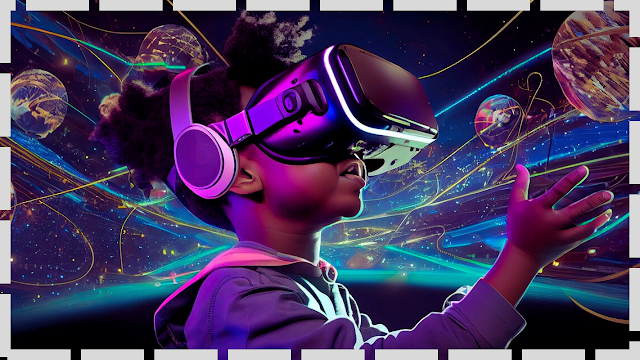The importance of artificial intelligence _ Technology that will change the face of the world
In an era marked by technological prowess, the role of artificial intelligence (AI) stands as a pivotal force reshaping the landscape of innovation and problem-solving. As we navigate the intricate webs of data and complexities of modern challenges, AI emerges as a beacon of transformative potential. This article delves into the crucial discourse surrounding the importance of artificial intelligence, exploring its multifaceted impact on industries, daily life, and the trajectory of human progress.
Harnessing the power of AI transcends mere technological advancement; it encapsulates a paradigm shift in how we perceive, analyze, and respond to the world's myriad intricacies. From machine learning algorithms optimizing efficiency to neural networks mimicking cognitive functions, artificial intelligence extends its influence far beyond the confines of code and computation. Join us on a journey to unravel the nuanced layers of significance that artificial intelligence brings to our rapidly evolving global landscape.
How important is artificial intelligence
Artificial Intelligence (AI) stands as a linchpin in the contemporary technological landscape, revolutionizing how we interact with information and solve complex problems. Its importance transcends the realm of mere innovation, acting as a catalyst for efficiency and breakthroughs across various industries. From predictive analytics optimizing business strategies to machine learning algorithms enhancing medical diagnoses, the transformative impact of AI is palpable.
In our tech-driven world, the efficiency boost provided by AI is unparalleled. Through automation and intelligent data analysis, tasks that once demanded extensive human involvement can now be streamlined, saving time and resources. This newfound efficiency not only accelerates progress but also empowers businesses and individuals to navigate an increasingly fast-paced and competitive environment.
Furthermore, the innovation spurred by artificial intelligence is reshaping the boundaries of what we thought possible. From self-driving cars navigating complex terrains to AI-generated art challenging our notions of creativity, the realm of possibilities continues to expand. AI serves as the driving force behind a new wave of technological advancements, pushing the boundaries of what we can achieve and redefining the scope of human potential. As we embrace this era of AI, its importance becomes ever more evident in shaping the trajectory of our collective future.
Read also: How important is technology _ Technology and education
Who invented artificial intelligence
The concept of artificial intelligence (AI) finds its roots in the mid-20th century, with pioneers laying the groundwork for machines to mimic human intelligence. Alan Turing, a British mathematician, is often considered a forefather, envisioning a test to determine a machine's ability to exhibit intelligent behavior equivalent to or indistinguishable from that of a human.
In the 1950s, the term "artificial intelligence" was coined by John McCarthy, an American computer scientist. McCarthy organized the Dartmouth Conference in 1956, a seminal event that marked the birth of AI as a formal field of study. This gathering brought together leading minds, sparking collaborations that set the stage for the development of AI as a distinct discipline.
While Turing and McCarthy made pivotal contributions, AI is a collaborative effort shaped by the work of numerous researchers worldwide. The field has evolved through the efforts of innovators like Marvin Minsky, Herbert A. Simon, and Allen Newell, each leaving an indelible mark on the landscape of artificial intelligence. The question of "who invented AI" is complex, reflecting the collective intelligence of those who, over decades, have contributed to its growth and advancement.
What are 5 disadvantages of artificial intelligence
In the realm of technological marvels, artificial intelligence (AI) bestows immense benefits but not without a flip side. Here are five critical drawbacks demanding our attention and consideration:
Is it possible to profit from artificial intelligence
The intersection of profitability and artificial intelligence (AI) is a dynamic landscape, where innovative ventures and strategic implementations can yield substantial returns. Businesses can harness AI for enhanced decision-making, predictive analytics, and process automation, resulting in increased operational efficiency and cost savings. By leveraging AI to understand customer behavior and preferences, companies can tailor their products and services, fostering customer loyalty and driving revenue growth.
Investment opportunities in the AI sector have also become a focal point for those seeking profitable ventures. Startups specializing in AI-driven technologies, from machine learning applications to robotics, have garnered attention from venture capitalists and investors eager to capitalize on the transformative potential of these innovations. Additionally, established businesses incorporating AI into their operations can experience increased competitiveness and market share, translating into financial gains as they stay ahead in the technological curve.
However, it's crucial to navigate this landscape with caution. While the potential for profit is evident, the integration of AI requires thoughtful planning and ethical considerations. Privacy concerns, regulatory compliance, and societal impacts must be addressed to ensure sustainable profitability. Striking a balance between innovation and responsibility is key to not only reaping the financial benefits of AI but also contributing to a positive and ethically sound technological future.
conclusion
the significance of artificial intelligence (AI) is paramount in shaping our contemporary landscape. From revolutionizing industries to influencing daily life, AI's transformative potential is undeniable. As we navigate the complexities of this tech-driven era, embracing the importance of AI is not merely a choice but an imperative for progress and innovation. In a world where algorithms intertwine with human endeavors, understanding, harnessing, and advancing AI remains instrumental for a future where intelligence, artificial or otherwise, propels us towards unprecedented possibilities and achievements. Embrace the power of AI – it's not just a tool; it's a cornerstone shaping the trajectory of our collective journey.
.png)


.png)
.png)
.png)
.png)